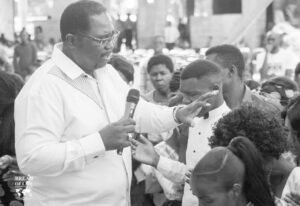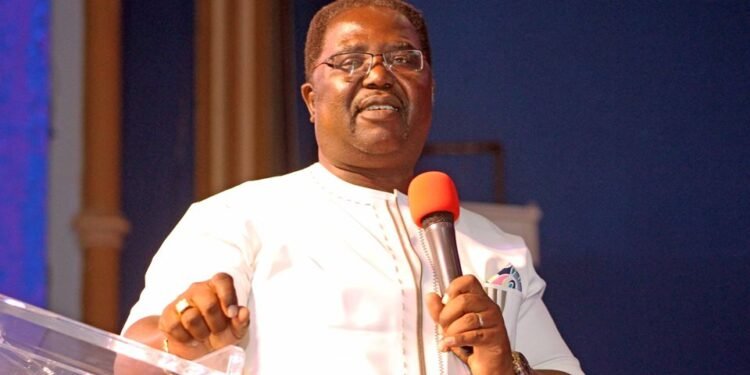The voice that stirred a nation for change: Where is Bishop Joseph Imakando now?
By Dr Lawrence Mwelwa
IN the final days leading up to the 2021 elections, a wind of prophetic urgency swept across the nation. At its center was a sermon that captured the pain, frustration, and hopes of millions. Bishop Joseph Imakando—a man whose influence, though significant, must never be viewed as solitary—spoke words that echoed across the country, seeding a vision of better days ahead.

His message was bold, timely, and struck a chord in the hearts of the weary: “People across the country are raising their voices—complaining about the lack of medical supplies in hospitals, the collapse of their businesses due to a weakening currency, the soaring cost of living, and the rise in violence. Others are burdened by the growing mountain of national debt. Clearly, something is not right. We cannot continue down this path. It is time to change what isn’t working. It is time to change direction. The time for change is now.”
And the people listened. They believed. Not only in the Bishop’s words, but in the weight those words seemed to carry. But that call for change did not belong to Bishop Imakando alone. It belonged to a broader moral voice—the Church in its fullness, the clergy across the land, young and old, titled and untitled. It was a moment that demanded unified clarity, a time for the prophets to take their rightful place, not in partisanship, but in priesthood.
Now, the same communities that once celebrated that hope find themselves burdened even deeper. The streets of Kanyama, Misisi, Mtendere, and Mandevu speak not of transformation but of disillusionment. Hunger knocks at more doors. Fear wears new faces. And the people, still listening, now hear only silence.
Honorable Members of Parliament have faced the humiliation of political weaponization—some even subjected to sodomy and degrading abuse. Seats in Parliament have been taken not through democracy but deception. The cost of living suffocates families, while tribal discrimination has become a tool of exclusion and punishment. Arbitrary arrests now replace dialogue. Violence simmers beneath the surface. The social fabric is fraying, and through it all, the voice of the clergy—once brave, once burdened—has grown faint.
This is not a call that centers on one man, no matter how respected or seasoned. Yes, Bishop Imakando’s voice matters, and yes, his influence helped shape the national mood. But this moment is not a critique of him alone—it is a lament over the silence of the clergy across our nation. Except for the unwavering stand of the Catholic Bishops, the prophetic landscape has fallen quiet. Emerging voices feel muzzled by tradition or hierarchy, unsure whether their convictions are valid in a space that once celebrated boldness but now rewards diplomacy.
And so, we must ask—not out of contempt but concern—where are the shepherds? When the change you advocate begins to harm rather than heal, does your responsibility not compel you to speak again? When policies born out of hope begin to crush the very people they were meant to lift, does the prophetic mandate not demand a response?
Scripture does not make silence a virtue in times of injustice. Amos thundered, “Woe to you who are at ease in Zion and feel secure… but do not grieve over the ruin of Joseph” (Amos 6:1-6). Isaiah wept for a nation that passed laws to oppress the poor and rob the innocent. The prophets did not hold back because of access to kings. They understood that silence in such moments is betrayal—of God, of people, of purpose.
We do not seek opposition for its own sake, nor do we idolize confrontation. But we must recover the voice of conscience within the Church. The gospel does not shrink from the streets. The priesthood of Christ was never meant to be domesticated by convenience. Now is the time to empower new voices, to let the young speak, to let the overlooked rise. And to our seasoned leaders—Bishop Imakando among them—we say: your wisdom is still needed, but so is your courage.
Let the prophetic fire fall again, not as a solo performance but as a chorus of conviction from every corner of the Church. Let us join with the Catholic bishops, not in competition, but in sacred agreement—that justice must be spoken, truth must be lived, and silence must never become complicity.
How to Buy e-Paper from The Mast
African wisdom reminds us: “The child who is not embraced by the village will burn it down to feel its warmth.” The cries from the compounds are not rebellion—they are a plea to be seen, to be heard, to be shepherded. And to every pastor, bishop, apostle, and priest across this land: your calling is not only to comfort but to confront, not only to bless but to build.
Many will miss heaven not because of the sins they committed, but for the good they refused to do. This moment is calling for all of us—not just one man—to do what is right. For the sake of the poor, the gospel, and the soul of the nation, the time to speak is now.

























